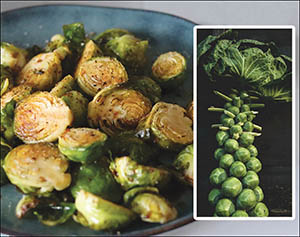Brussels sprouts are members of the cabbage family and they look like it, too. In fact, many people call them little cabbages.
By Alison Crane
Yes, you read it right, April is Brussels Sprouts and Cabbage Month. Before you turn up your nose to those rather smelly-when-cooked veggies, consider all of the benefits gained from the lowly and maligned mini-cabbage and its compadre.
Brussels sprouts are a cruciferous vegetable (the same genus as broccoli, cabbage, collard greens, and kale) which makes them full of phytonutrients that may help protect against cancer. One-half cup of boiled sprouts provides more than 80 percent of the recommended daily amount of vitamin C. They are also a great source of vitamin A, potassium, folate, iron, fiber, and protein.
People living in Mediterranean areas have been eating Brussels sprouts since the 5th century, but it wasn’t until the 13th century in Belgium that they got their name and became popular across Europe. French settlers to Louisiana first brought them to the Americas during the 18th century and they were first grown commercially in 1920 in California. Now, Brussels sprouts is a popular grocery store item.
Since Brussels sprouts look like small cabbages, many people assume they are the same. Both are cool-weather growers, but cabbages grow directly out of the ground and form a head. Brussels sprouts are buds that grow along a stalk. They are not easy to grow but Extension does have a tip sheet for growing them at home.
While growing Brussels sprouts may not be the easiest thing to do, cooking them is. They can be boiled, roasted, sautéed, grilled, and more! You can also include them raw in salads. Keeping bags of frozen Brussels sprouts makes it very convenient to add them to your meals on a regular basis.
If you are going to use fresh sprouts, be sure to prepare them quickly once you purchase them because their flavor will become unpleasantly strong after three or four days. Our Extension website has information on selecting and preparing these nutritious vegetables.
If you would like information about healthy and tasty ways to add more nutrition to your diet, contact the Garland County Extension office at 236 Woodbine, Hot Springs, Arkansas, or call 501-623-6841 for more details. Follow our Facebook page @GarlandCountyExtension-UADA, or visit www.uaex.uada.edu/.
Alison Crane is a Family and Consumer Sciences Agent with the Garland County Extension Service. The University Alison Crane is a Family and Consumer Sciences Agent with the Garland County Extension Service. The University of Arkansas System Division of Agriculture offers all its Extension and Research programs to all eligible persons without regard to race, color, sex, gender identity, sexual orientation, national origin, religion, age, disability, marital or veteran status, genetic information, or any other legally protected status, and is an Affirmative Action/Equal Opportunity Employer.









